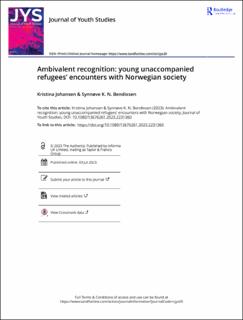Ambivalent recognition: young unaccompanied refugees’ encounters with Norwegian society
Journal article, Peer reviewed
Published version

Åpne
Permanent lenke
https://hdl.handle.net/11250/3078515Utgivelsesdato
2023Metadata
Vis full innførselSamlinger
Sammendrag
Receiving the right to stay in Norway might seem a critical factor for refugees’ well-being and belonging. Yet, this research shows that young unaccompanied refugees experience ambivalent feelings towards Norwegian society after their resettlement. The study is based on a qualitative research design with 14 young unaccompanied refugees residing in Norway. Drawing on recognition theory, we focus on how participants’ psychosocial well-being is constituted through their encounters with social workers and helpers, restrictive asylum policies, and anti-immigration discourses in Norwegian society. Our findings suggest that, while social workers are central to the well-being of these young people, their interaction is sometimes perceived by the young people as emotional misrecognition. Further, while they have the right to residency, their right to family life is not fully recognised, and this poses a threat to their well-being. Anti-immigration discourses contribute further to feelings of ambivalent recognition. Participants strived to manage through active involvement in relationships, everyday coping, sensemaking, critical reflection and social engagement, insisting on their own and other refugees’ worth. We argue that youth-focused social services must explicitly engage with these young people’s broader legal, emotional and social (mis)recognition and with their ways of managing challenges when assisting them in achieving well-being.
